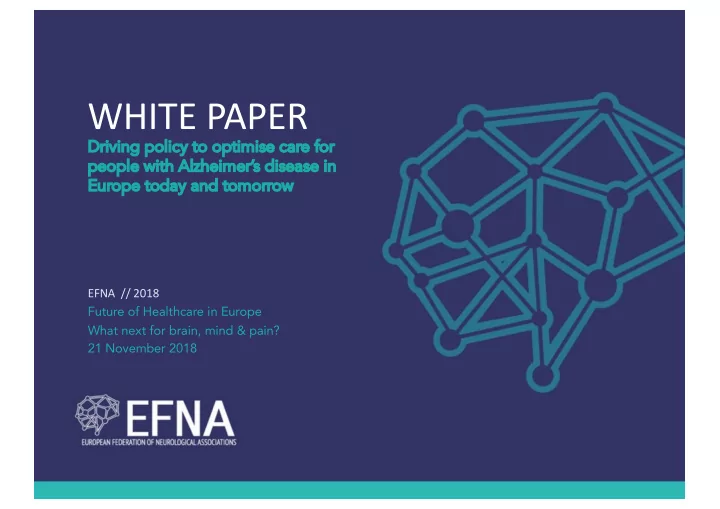

WHITE PAPER Driving ng p policy t to o optimise c e care f e for pe peopl ple wi with Alzheimer’s di disease in Eur urope t e today a and nd t tomorrow EFNA // 2018 Future of Healthcare in Europe What next for brain, mind & pain? 21 November 2018
Agenda • Introduction to the White Paper • Background: the What if series • Key themes and challenges • Policy recommendations • Next steps: what can MEPs do?
Introduction Objectives Collaborative parties Challenge the status quo and refresh the EU policy debate on the future of AD Generate new angles to connect AD with other policy fields (e.g. human rights) Adrian Ivanoiu, Bring together stakeholders in the AD Professor of policy environment to generate policy Neurology, recommendations UCLouvain Chris Gastmans, Ensure that recommendations are Professor of Medical Ethics, actionable and taken forward by KU Leuven policymakers Ensuring a better today and tomorrow for people with Alzheimer’s Strategic Vision through joint policy action to support early detection and diagnosis and prepare health systems for innovative treatments
Background: the What if series The What if series of policy roundtables Hosted in the European Parliament by members of the Key thematic areas European Alzheimer’s Alliance Stakeholders in neurology and other relevant fields (e.g. insurance, tech developers and researchers) Roundtable 1: Human rights Overcoming the stigma, discrimination and Policy recommendations inequalities faced by people with Alzheimer’s Roundtable 2: Ethics Overcoming the ethical challenges of early detection and diagnosis Roundtable 3: Socioeconomic impact The economic implications of Alzheimer’s in Europe
Key themes of the White Paper Theme s Challenges Ethics The right to know and not to know, Overcoming the ethical challenges of data privacy and the ethics of tech early detection and diagnosis innovation The right to dignity Human rights protection, especially the Overcoming the stigma, discrimination right to diagnosis, treatment and care, and inequalities faced by people with health inequalities between genders Alzheimer’s The socioeconomic burden of The socioeconomic impact informal care, the value of treatment, The socioeconomic impact of Alzheimer’s the need to prepare health systems in Europe for the future, and overcome silos
Key policy recommendations Socioeconomic impact Ethics The right to dignity Collective stakeholder engagement and dialogue to: Engage with national Ensure policy action and Ensure the implementation governments on the further social care funding on of the current UN implementation and national level to alleviate the Convention on the Rights of revision of national AD informal care burden Person with Disabilities and dementia strategies (CRPD) to ensure the right to early Ensure that national HTA and detection, diagnosis and pricing and reimbursement treatment systems are prepared for the arrival of disease modifying treatments for AD
Continued engagement with organisations representing people with AD, their families and their carers to ensure the systematic involvement of people with AD to drive policy change at a national, EU or global level Sufficient support for research into neurological conditions through a “Brain Mission” under Horizon Europe Advocate for a high-level Commission coordinator for neurological disorders to ensure coherence across Directorates and Overall policy policies recommendations
Next steps: what can MEPs do? EU Level Member state level Use political campaigns ahead of the Write to your party’s health 2019 EP elections spokesperson about improving human rights & coordination for AD patients Coordinate national MEPs to align campaigns and engage with relevant Meet with national stakeholders national campaigning organisations § professional groups § Engage with the European Commission people living with dementia § group of Governmental Experts on health leaders and policymakers § dementia Advocate for a high level European Commission coordinator for neurological disorders
THANK YOU FOR LISTENING We hope you enjoyed this presentation.
Recommend
More recommend